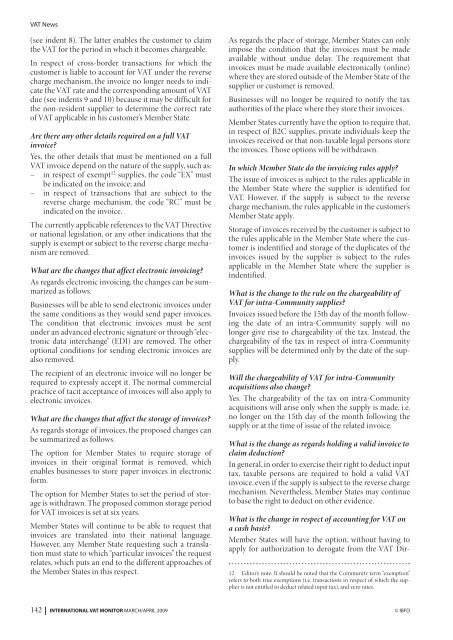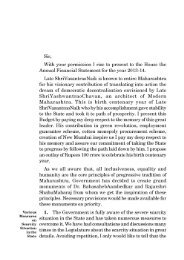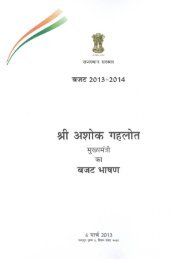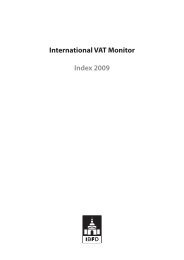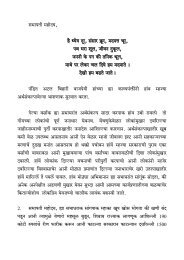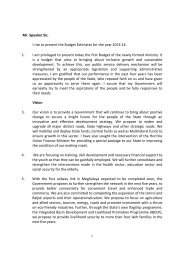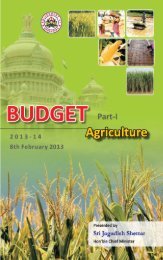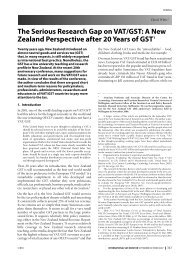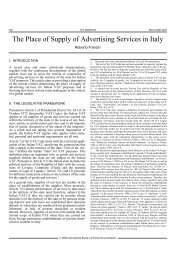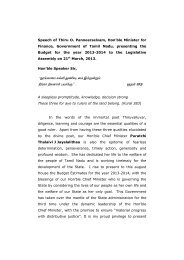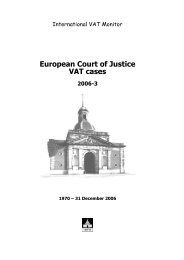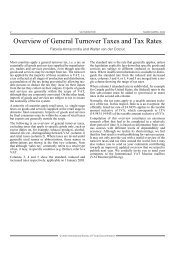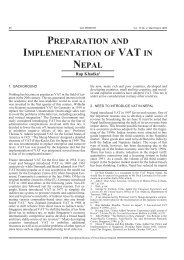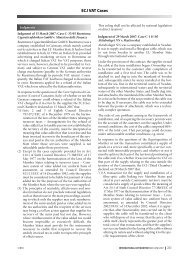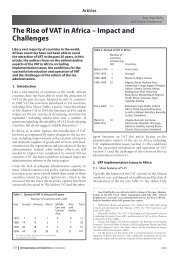VAT News - empcom.gov.in
VAT News - empcom.gov.in
VAT News - empcom.gov.in
You also want an ePaper? Increase the reach of your titles
YUMPU automatically turns print PDFs into web optimized ePapers that Google loves.
<strong>VAT</strong> <strong>News</strong><br />
(see <strong>in</strong>dent 8). The latter enables the customer to claim<br />
the <strong>VAT</strong> for the period <strong>in</strong> which it becomes chargeable.<br />
In respect of cross-border transactions for which the<br />
customer is liable to account for <strong>VAT</strong> under the reverse<br />
charge mechanism, the <strong>in</strong>voice no longer needs to <strong>in</strong>dicate<br />
the <strong>VAT</strong> rate and the correspond<strong>in</strong>g amount of <strong>VAT</strong><br />
due (see <strong>in</strong>dents 9 and 10) because it may be difficult for<br />
the non-resident supplier to determ<strong>in</strong>e the correct rate<br />
of <strong>VAT</strong> applicable <strong>in</strong> his customer’s Member State.<br />
Are there any other details required on a full <strong>VAT</strong><br />
<strong>in</strong>voice?<br />
Yes, the other details that must be mentioned on a full<br />
<strong>VAT</strong> <strong>in</strong>voice depend on the nature of the supply, such as:<br />
– <strong>in</strong> respect of exempt12 supplies, the code “EX” must<br />
be <strong>in</strong>dicated on the <strong>in</strong>voice; and<br />
– <strong>in</strong> respect of transactions that are subject to the<br />
reverse charge mechanism, the code “RC” must be<br />
<strong>in</strong>dicated on the <strong>in</strong>voice.<br />
The currently applicable references to the <strong>VAT</strong> Directive<br />
or national legislation, or any other <strong>in</strong>dications that the<br />
supply is exempt or subject to the reverse charge mechanism<br />
are removed.<br />
What are the changes that affect electronic <strong>in</strong>voic<strong>in</strong>g?<br />
As regards electronic <strong>in</strong>voic<strong>in</strong>g, the changes can be summarized<br />
as follows.<br />
Bus<strong>in</strong>esses will be able to send electronic <strong>in</strong>voices under<br />
the same conditions as they would send paper <strong>in</strong>voices.<br />
The condition that electronic <strong>in</strong>voices must be sent<br />
under an advanced electronic signature or through “electronic<br />
data <strong>in</strong>terchange” (EDI) are removed. The other<br />
optional conditions for send<strong>in</strong>g electronic <strong>in</strong>voices are<br />
also removed.<br />
The recipient of an electronic <strong>in</strong>voice will no longer be<br />
required to expressly accept it. The normal commercial<br />
practice of tacit acceptance of <strong>in</strong>voices will also apply to<br />
electronic <strong>in</strong>voices.<br />
What are the changes that affect the storage of <strong>in</strong>voices?<br />
As regards storage of <strong>in</strong>voices, the proposed changes can<br />
be summarized as follows.<br />
The option for Member States to require storage of<br />
<strong>in</strong>voices <strong>in</strong> their orig<strong>in</strong>al format is removed, which<br />
enables bus<strong>in</strong>esses to store paper <strong>in</strong>voices <strong>in</strong> electronic<br />
form.<br />
The option for Member States to set the period of storage<br />
is withdrawn. The proposed common storage period<br />
for <strong>VAT</strong> <strong>in</strong>voices is set at six years.<br />
Member States will cont<strong>in</strong>ue to be able to request that<br />
<strong>in</strong>voices are translated <strong>in</strong>to their national language.<br />
However, any Member State request<strong>in</strong>g such a translation<br />
must state to which “particular <strong>in</strong>voices” the request<br />
relates, which puts an end to the different approaches of<br />
the Member States <strong>in</strong> this respect.<br />
As regards the place of storage, Member States can only<br />
impose the condition that the <strong>in</strong>voices must be made<br />
available without undue delay. The requirement that<br />
<strong>in</strong>voices must be made available electronically (onl<strong>in</strong>e)<br />
where they are stored outside of the Member State of the<br />
supplier or customer is removed.<br />
Bus<strong>in</strong>esses will no longer be required to notify the tax<br />
authorities of the place where they store their <strong>in</strong>voices.<br />
Member States currently have the option to require that,<br />
<strong>in</strong> respect of B2C supplies, private <strong>in</strong>dividuals keep the<br />
<strong>in</strong>voices received or that non-taxable legal persons store<br />
the <strong>in</strong>voices. Those options will be withdrawn.<br />
In which Member State do the <strong>in</strong>voic<strong>in</strong>g rules apply?<br />
The issue of <strong>in</strong>voices is subject to the rules applicable <strong>in</strong><br />
the Member State where the supplier is identified for<br />
<strong>VAT</strong>. However, if the supply is subject to the reverse<br />
charge mechanism, the rules applicable <strong>in</strong> the customer’s<br />
Member State apply.<br />
Storage of <strong>in</strong>voices received by the customer is subject to<br />
the rules applicable <strong>in</strong> the Member State where the customer<br />
is <strong>in</strong>dentified and storage of the duplicates of the<br />
<strong>in</strong>voices issued by the supplier is subject to the rules<br />
applicable <strong>in</strong> the Member State where the supplier is<br />
<strong>in</strong>dentified.<br />
What is the change to the rule on the chargeability of<br />
<strong>VAT</strong> for <strong>in</strong>tra-Community supplies?<br />
Invoices issued before the 1 th day of the month follow<strong>in</strong>g<br />
the date of an <strong>in</strong>tra-Community supply will no<br />
longer give rise to chargeability of the tax. Instead, the<br />
chargeability of the tax <strong>in</strong> respect of <strong>in</strong>tra-Community<br />
supplies will be determ<strong>in</strong>ed only by the date of the supply.<br />
Will the chargeability of <strong>VAT</strong> for <strong>in</strong>tra-Community<br />
acquisitions also change?<br />
Yes. The chargeability of the tax on <strong>in</strong>tra-Community<br />
acquisitions will arise only when the supply is made, i.e.<br />
no longer on the 1 th day of the month follow<strong>in</strong>g the<br />
supply or at the time of issue of the related <strong>in</strong>voice.<br />
What is the change as regards hold<strong>in</strong>g a valid <strong>in</strong>voice to<br />
claim deduction?<br />
In general, <strong>in</strong> order to exercise their right to deduct <strong>in</strong>put<br />
tax, taxable persons are required to hold a valid <strong>VAT</strong><br />
<strong>in</strong>voice, even if the supply is subject to the reverse charge<br />
mechanism. Nevertheless, Member States may cont<strong>in</strong>ue<br />
to base the right to deduct on other evidence.<br />
What is the change <strong>in</strong> respect of account<strong>in</strong>g for <strong>VAT</strong> on<br />
a cash basis?<br />
Member States will have the option, without hav<strong>in</strong>g to<br />
apply for authorization to derogate from the <strong>VAT</strong> Dir-<br />
12. Editor’s note: It should be noted that the Community term “exemption”<br />
refers to both true exemptions (i.e. transactions <strong>in</strong> respect of which the supplier<br />
is not entitled to deduct related <strong>in</strong>put tax), and zero rates.<br />
142 INTERNATIONAL <strong>VAT</strong> MONITOR MARCH/APRIL 2009 © IBFD


